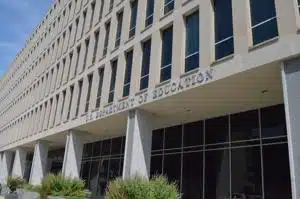(The Center Square) – Two nonprofits run by an attorney with long-time Democratic connections have been filing ethics complaints against lawyers who represented Trump officials or issues, seeking to get them disbarred or disciplined.
But an investigation by The Center Square found nearly all of the attorneys the groups targeted received no public discipline years after the complaints were filed.
Critics and documents also raise questions about the group’s nonprofit status, lack of transparency and connections to other nonprofits who claim to avoid political issues.
Utah attorney Michael Teter, who worked for the Democratic party and ran Democratic campaigns, is managing director of The 65 Project and executive director of the Legal Accountability Center. Both groups’ websites talk about holding accountable attorneys who filed lawsuits challenging the 2020 presidential election results and supported other “anti-Democratic activity,” charging the lawyers violated their oaths by knowingly filing false lawsuits and supporting disinformation.
But a Center Square review of nearly 80 complaints filed against attorneys by The 65 Project between 2022 and 2023 in various states show only three resulted in public discipline against the attorneys, and it is not clear whether the nonprofit’s complaints prompted the actions. Two disciplines came after criminal convictions and one was initiated by the California bar six months after The 65 Project complaint.
Last year, America First Legal, a nonprofit law firm that supports right of center issues, filed an ethics complaint against Teter in Utah for The 65 Project’s actions, but the Utah State Bar association does not show any action was taken on the October 2024 complaint.
“For too long, ‘lawfare’ like that undertaken by The 65 Project and other, similarly motivated groups, has chilled attorneys across the country from representing clients or advancing certain lawful positions for those clients,” the firm’s executive director Gene Hamilton said in a news release on their website. “Seeking the personal destruction and financial ruin of another lawyer – simply because of the client he represented or the cause he took up – runs counter to not only the letter and spirit of the law governing the activities of lawyers…
“We seek a return to a world in which lawyers can be lawyers, zealously advocate for their clients, and strive for a better future without fear of harassment or intimidation simply because of the clients or causes they take up,” he added. “The abuses of the system must stop.”
The Teter-run groups repeatedly ignored requests by The Center Square to document their accomplishments and comment on their tactics.
The Center Square attempted to find discipline against the attorneys on the bar association websites of the jurisdictions where the complaints were filed and reached out to bar associations that didn’t clearly provide the information online. Most of the attorneys that The 65 Project filed complaints against two or three years ago showed no public discipline on the bar websites though that leaves open the possibility of confidential private discipline.
Many of the bar associations The Center Square contacted refused to provide any additional information about the nonprofit’s complaints.
“The State Bar generally does not confirm the existence or status of a grievance against a Georgia-barred attorney,” wrote Georgia bar spokeswoman Jennifer R. Mason after The Center Square inquired about the status of a half dozen complaints from The 65 Project. “We are unable to comment further.”
The group of about 80 attorneys with complaints filed against them includes 15 former and current Republican state attorneys general, but they all remained in good standing and with no public discipline in their states.
The State Bar of Nevada, however, confirmed The 65 Project complaint filed there was quickly dismissed for lack of evidence.
The “case wasn’t strong enough to meet our clear and convincing standard,” wrote Nevada Bar Counsel Daniel M. Hooge in an exchange with The Center Square. “It involved subjective claims of frivolity and dishonesty. Because they are subjective, we would need some support either from a general community consensus, prior cases creating clear controlling precedent, or judicial action. We didn’t have those in this case.
“It was divided along political lines, there was no prior case law that clearly addressed the same issues, and the judges in the cases did not sanction Mr. [Jesse] Binnall,” he added. “This case had little to no chance of success at hearing.”
Binnall, a Virginia attorney who The 65 Project complaint says joined in a Nevada lawsuit to substitute Biden electors with those who supported Trump, did not respond to requests for comment.
The group also filed a complaint in Massachusetts against renowned Harvard Law professor and constitutional scholar Alan Dershowitz, charging he knowingly filed a false lawsuit to “discredit elections and voting procedures.”
But Dershowitz said he received no discipline, and the Massachusetts bar website shows no discipline against him.
The “frivolous and politically motivated complaint was dismissed, as it should have been,” Dershowitz wrote in a brief email exchange with The Center Square.
The 65 Project complaint notes that a judge sanctioned Dershowitz for signing a complaint he should have known was frivolous – called a Rule 11 violation. But the Ninth Circuit Court of Appeals overturned the judge’s decision, writing “this court has not previously clearly articulated the rule that of-counsel attorneys may be sanctioned under Rule 11, the panel declined to give its holding retroactive effect.”
Neither The 65 Project nor the Legal Accountability Center make their tax returns public as is required of most organizations with federal nonprofit status. In exchange for privileges like not having to pay taxes and donors getting a tax write off, nonprofits must let the public see how much money they collect and what they spend on salaries, fundraising and other expenses. Nonprofits are required to provide those returns to anyone who requests them and most are on websites that track nonprofit activity.
A search of databases for The 65 Project and Legal Accountability Center 990 tax returns produced no results so The Center Square contacted the IRS and the nonprofits. The IRS did not respond.
The 65 Project public relations person Eddie Vale responded to a request for the group’s 990s by saying the group does not have its own tax returns.
“The 65 Project is a fiscally sponsored project of Global Impact, so the relevant 990s belongs to the fiscal sponsor,” he wrote in response to The Center Square’s request to see the groups tax returns as federal law requires.
While Global Impact’s tax returns are available online, they do not specifically provide income, spending and pay data for either of Teter’s organizations.
Vale didn’t respond to repeated follow up requests asking for an interview with Teter, and no one from LAC responded to repeated requests for 990s or interviews with staff.
LAC website says they are a 501c(4), which allows them to do campaigning though it is not their primary activity. A web link that has since been taken down connects them to the Democracy Fund, but the Fund’s nonprofit tax returns do not mention the LAC. No one from the Fund responded to requests for comment.
LAC has filed three complaints against Trump Department of Justice attorneys and is also representing California Gov. Gavin Newsom in a $787 million defamation complaint against Fox News. The complaints against the DOJ attorneys were all filed July 31 and there is nothing about them on the District of Columbia bar website.
Fox News is disputing Newsom’s libel claim but did not provide a comment about the LAC’s involvement in the case.
Teter was deputy finance director for the California Democratic Party in the late 1990s; was campaign manager for U.S. Sen. Herb Kohl, D-Wisc., and Wisconsin field director for John Kerry’s failed presidential run; and worked at the Democratic Campaign Committee, according to his Linkedin profile.
He also worked at Perkins Coie between 2006 and 2008 – a law firm that was targeted by a Trump executive order to suspend security clearances for their attorneys after Trump determined that the firm worked with Hillary Clinton on the Steele Dossier and discriminated in hiring by implementing DEI programs.
Teter’s nonprofits are clearly designed to make it difficult for Trump officials and issues to get legal representation, according to Tom Jones, executive director of the conservative American Accountability Foundation, and the nonprofit’s own website.
“The complaints are intended to harass attorneys and force them to spend money defending themselves because (The 65 Project and LAC) don’t like the policy,” Jones said.
The 65 Project’s website seems to echo that.
“The 65 Project will work to hold accountable the lawyers who raise fraudulent claims to overturn legitimate elections results, while also creating a rule-based system to prevent future attempts and to strengthen the mechanisms for accountability and deterrence,” according The 65 Project’s website.
One employee anonymously put in much more stark terms in a 2022 Axios story about The 65 Project, which the group’s website said is named after the 65 lawsuits filed by Trump supporters to overturn the 2020 election.
“This is mostly important for the deterrent effect that it can bring so that you can kill the pool of available legal talent going forward,” the story quoted the anonymous source.
The article predominantly reports on the activities of nonprofits linked to Democratic operatives targeting lawyers involved in Trump-related legal challenges without explicitly endorsing or condemning their actions in clear ideological terms. However, the selection and framing of information—including the emphasis on the limited success of the complaints, the lack of transparency from the groups, critical quotes from conservative sources, and highlighting the political background of individuals involved—suggest a subtle skepticism toward the Democratic-linked groups. The tone is investigative and somewhat critical, aligning with a center-right perspective that questions the legitimacy and motives of left-leaning legal accountability efforts. While it attempts to present facts and statements from multiple viewpoints, the framing leans toward undermining the Democrats’ ethical complaint initiatives, rather than neutrally reporting on the groups’ ideological stances alone.
















































